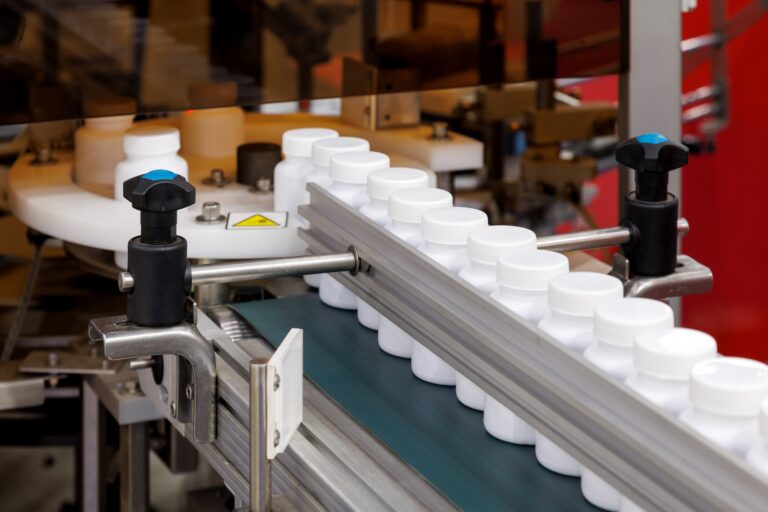Why Proper Contract Manufacturer Vetting Matters
Choosing the wrong contract manufacturer can result in:
- Product quality issues and customer complaints
- Regulatory compliance problems and FDA violations
- Delayed launches and missed market opportunities
- Hidden costs and budget overruns
- Damaged brand reputation
A thorough vetting process protects your investment and ensures your products meet the highest standards of quality and safety.
Essential Questions to Ask Contract Manufacturers
Do They Actually Manufacture In-House?
Why This Matters:
Many companies pose as manufacturers while simply acting as middlemen, outsourcing your work to third parties. This creates quality control issues and removes your oversight of the manufacturing process.
Questions to Ask:
- “Can you provide a tour of your manufacturing facilities?”
- “What specific equipment do you own and operate?”
- “Who will be directly responsible for manufacturing my products?”
Red Flag:
If they hesitate to offer a facility tour or provide vague answers about their equipment, they may be a broker rather than a true manufacturer.
What Certifications and Compliance Standards Do They Hold?
Stringent Production Requirements:
- FDA Registration and Inspection Status – Ensures compliance with federal regulations
- USDA Organic Certification – Required for organic product claims
- GMP (Good Manufacturing Practices) – Industry standard for quality systems
- NSF International Certification – Third-party quality verification
- ISO Certifications – International quality management standards
Questions to Ask:
- “Can you provide copies of all current certifications?”
- “When was your last FDA inspection, and what were the results?”
- “How do you maintain compliance with changing regulations?”
Can You Tour Their Manufacturing Facilities?
Why Facility Tours Are Essential:
- Verify they actually manufacture products on-site
- Assess cleanliness and organization standards
- Meet the team who will handle your products
- Evaluate equipment quality and capabilities
- Observe quality control procedures in action
What to Look For During Tours:
- Clean, well-organized production areas
- Modern, well-maintained equipment
- Proper safety protocols and procedures
- Qualified, knowledgeable staff
- Robust quality control systems
How Responsive Are They to Communication?
Warning Signs of Poor Communication:
- Difficulty reaching live representatives
- Delayed responses to emails and calls
- Always being redirected to voicemail or receptionists
- Vague or incomplete answers to technical questions
What Good Communication Looks Like:
- Prompt responses within 24-48 hours
- Direct access to project managers and technical staff
- Proactive updates on project status
- Clear, detailed explanations of processes and timelines
Can They Provide Customer References?
Why References Matter:
Established manufacturers should be proud of their work and willing to connect you with satisfied customers who can share honest feedback about their experience.
Questions to Ask References:
- “How was the overall experience working with this manufacturer?”
- “Did they meet promised timelines and quality standards?”
- “How did they handle any issues or challenges that arose?”
- “Would you recommend them and work with them again?”
Do They Carry Product Liability Insurance?
Critical Insurance Requirements:
- Product liability insurance with adequate coverage limits
- Insurance policy should name the manufacturer specifically
- Coverage should extend to your products and brand
Why This Matters:
Without proper insurance coverage, you have no protection if manufacturing defects lead to product liability claims.
Red Flags to Avoid
Business Verification Red Flags
- Short Business History: Companies in business less than 3-5 years may lack experience handling complex challenges
- No Online Presence: Legitimate manufacturers maintain professional websites and online reviews
- Poor Online Reviews: While no company is perfect, consistently negative reviews indicate systemic problems
- Unlicensed Operations: Always verify business licenses and registrations
Operational Red Flags
- Reluctance to Provide Tours: Legitimate manufacturers welcome facility visits
- Vague Responses: Inability to provide specific details about processes and capabilities
- No Quality Documentation: Lack of quality manuals, SOPs, or testing protocols
- Unrealistic Promises: Extremely low prices or impossibly fast timelines often indicate corners being cut
Additional Services and Capabilities
One-Stop Shop Services
The best contract manufacturers offer comprehensive services that simplify your operations:
Manufacturing Services:
Support Services:
- Regulatory compliance assistance
- Label design and printing
- Inventory management and storage
- Quality control and testing
- Logistics
Business Development:
- Market research and trend analysis
- Product development consultation
- Scaling and expansion support
Quality Control and Testing Capabilities
Essential Testing Services:
- Raw material identity and purity testing
- Microbiological testing
- Heavy metals and contaminants screening
- Potency and stability testing
- Finished product verification
Making Your Final Decision
Contract Manufacturer Evaluation Scorecard
Rate each potential manufacturer on these criteria (1-5 scale):
Quality and Compliance (40% weight):
- FDA compliance and inspection history
- Certifications and quality systems
- Testing and quality control capabilities
- Product consistency and reliability
Communication and Service (25% weight):
- Responsiveness and accessibility
- Technical expertise and knowledge
- Customer service quality
- Project management capabilities
Capabilities and Capacity (20% weight):
- Manufacturing equipment and technology
- Production capacity and scalability
- Additional services offered
- Geographic location and logistics
Business Stability (15% weight):
- Years in business and financial stability
- Customer references and reputation
- Insurance coverage and risk management
- Pricing competitiveness and transparency
Next Steps After Selection
- Negotiate Clear Contracts: Define quality standards, timelines, pricing, and responsibilities
- Establish Communication Protocols: Set regular check-in schedules and reporting requirements
- Plan Quality Oversight: Schedule regular facility visits and quality audits
- Develop Contingency Plans: Prepare backup options in case issues arise
Why Choose Health Genesis as Your Contract Manufacturer
At Health Genesis, we understand that selecting the right contract manufacturer is crucial for your success. We’re proud to offer:
Comprehensive Manufacturing Capabilities:
- FDA-inspected facilities with full GMP compliance
- USDA Organic certification for natural products
- State-of-the-art equipment and quality control systems
- Expert formulation and product development services
One-Stop Shop Services:
- Private label and contract manufacturing
- Custom formulation development
- Regulatory compliance assistance
- Label design and printing services
- Inventory management and logistics
- Amazon FBA preparation and services
Proven Track Record:
- Over 20 years of manufacturing excellence
- Hundreds of satisfied customers across multiple industries
- Consistent FDA compliance with clean inspection history
- Comprehensive product liability insurance coverage
Commitment to Quality:
Our mission is to harness nature’s power to heal and sustain, sharing its bounty with our clients through science-based products backed by rigorous research. Development, production, and quality are the cornerstones of everything we do.
Ready to discuss your contract manufacturing needs? Contact our team today for a consultation and facility tour.
Frequently Asked Questions
How long should the contract manufacturer selection process take?
The vetting process typically takes 4-8 weeks, including initial research, facility tours, reference checks, and final negotiations. Rushing this process often leads to costly mistakes later.
What's the difference between contract manufacturing and private labeling?
Contract manufacturing involves creating custom formulations and products specifically for your brand, while private labeling uses existing formulations with your branding applied.
How do I verify FDA compliance for a contract manufacturer?
Request copies of FDA registration certificates, recent inspection reports, and ask for specific details about their GMP compliance programs. You can also search the FDA’s database for inspection history.
What should I expect to pay for contract manufacturing services?
Costs vary significantly based on product complexity, volume, and services required. Quality manufacturers provide transparent pricing with detailed breakdowns of all costs involved.
How can I protect my proprietary formulations?
Ensure your contract manufacturer signs comprehensive non-disclosure agreements (NDAs) and confidentiality agreements before sharing any proprietary information.

